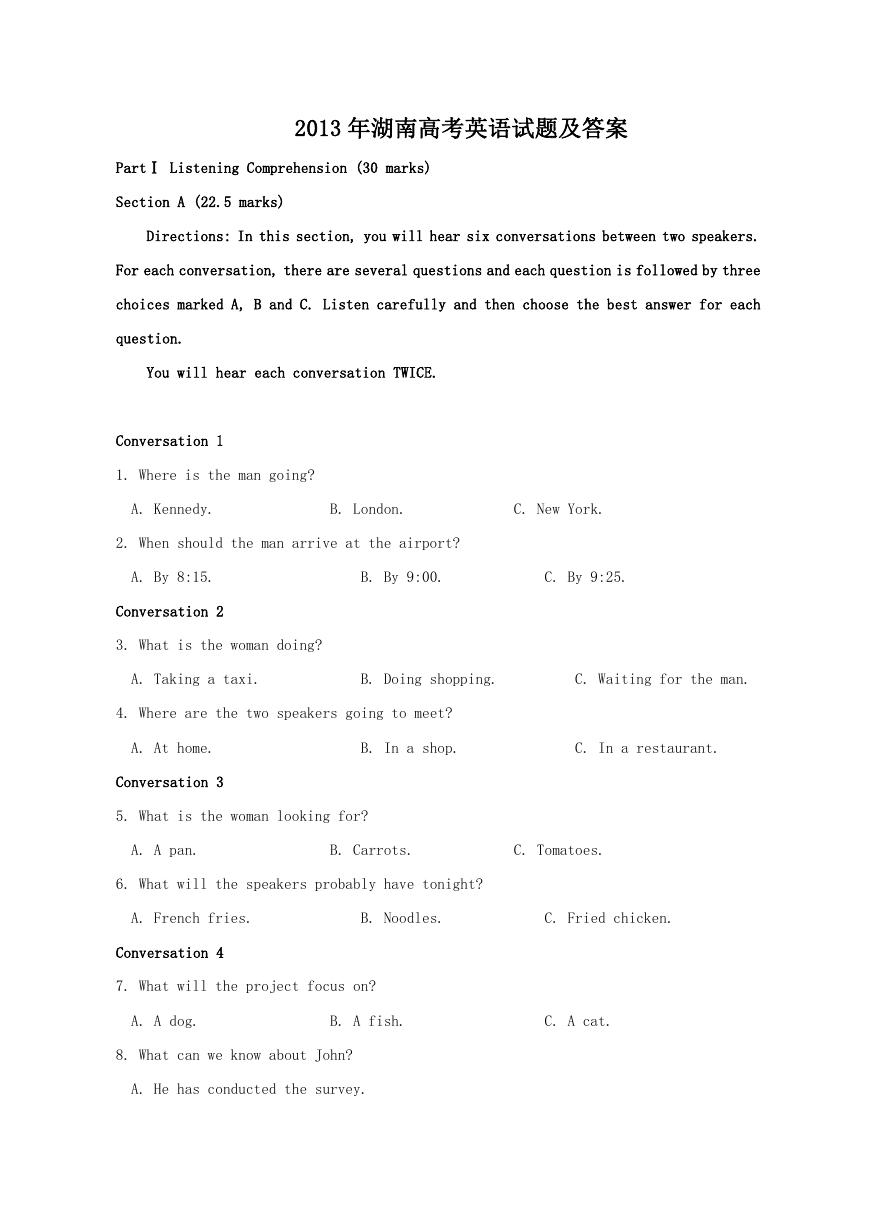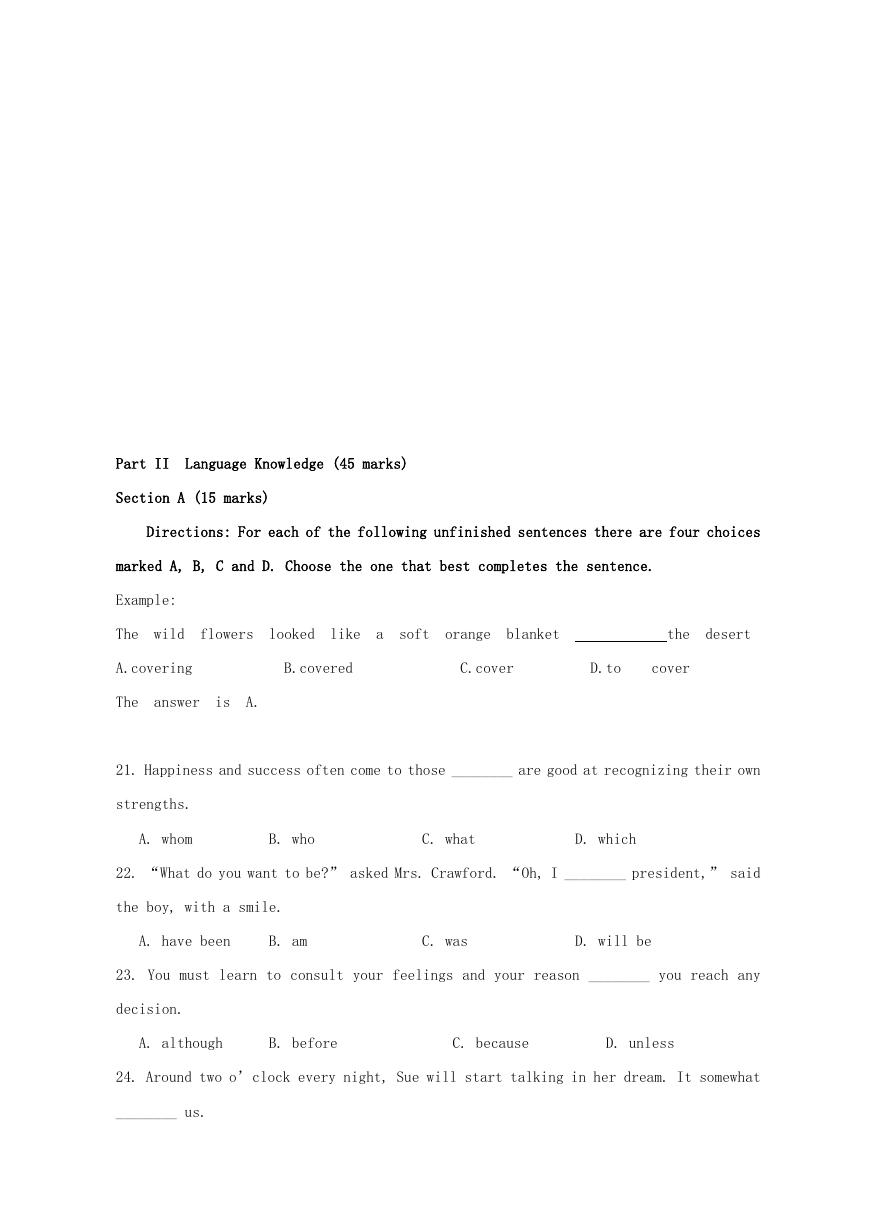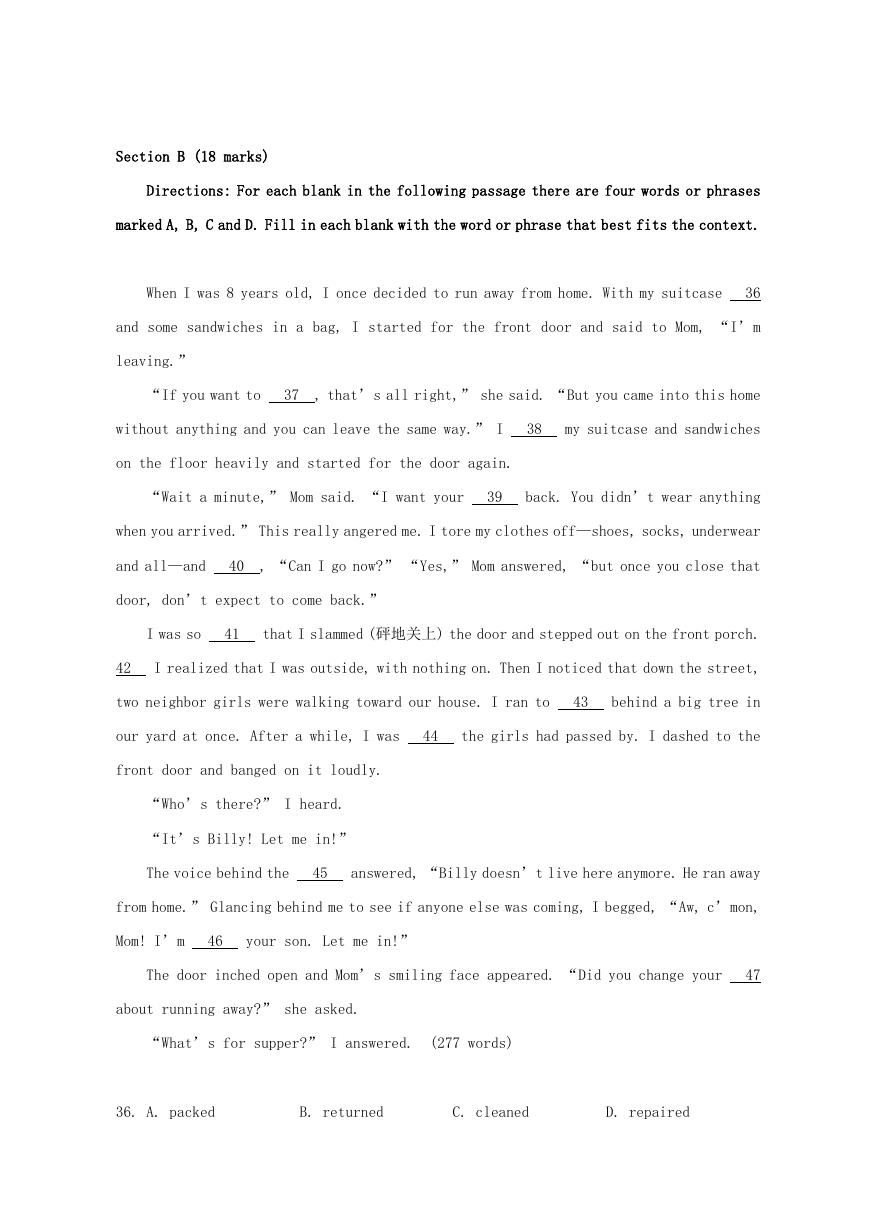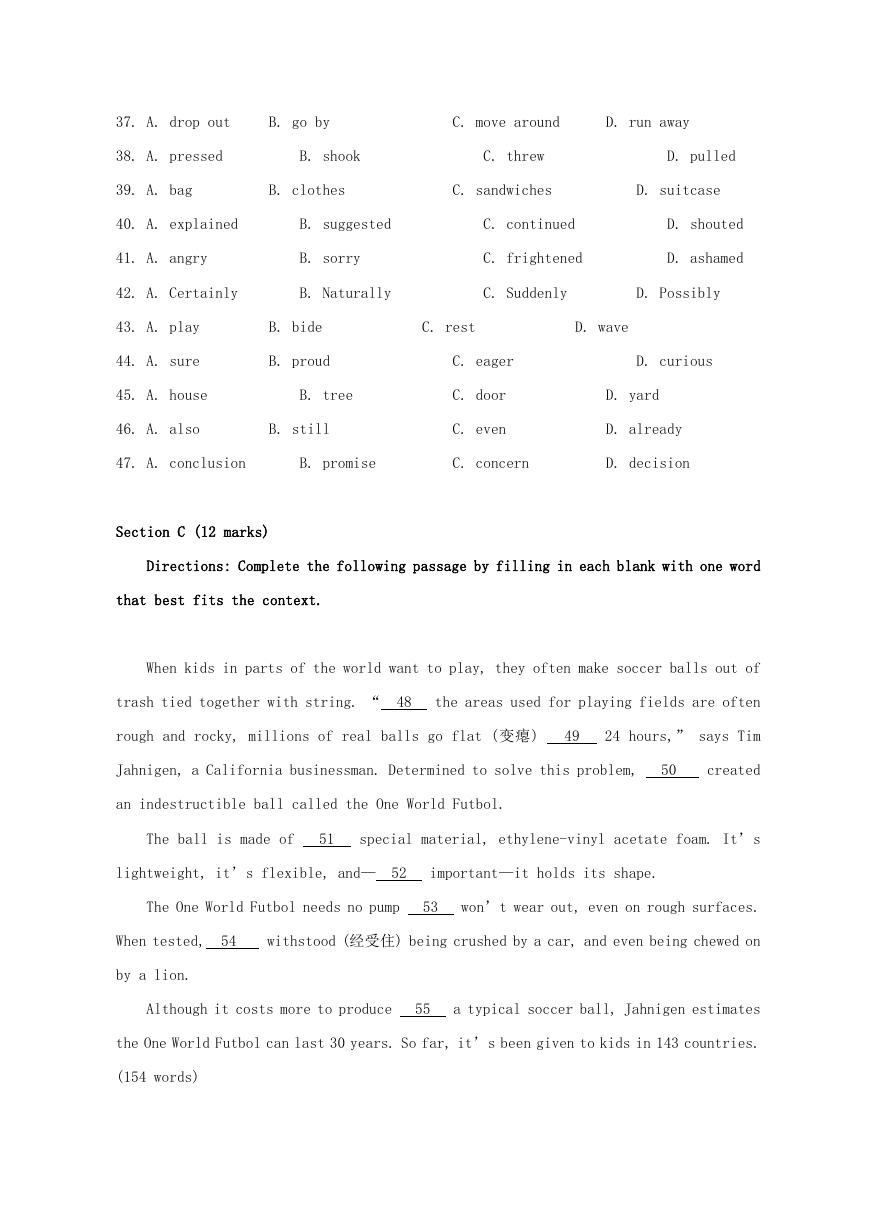2013 年湖南高考英语试题及答案
PartⅠ Listening Comprehension (30 marks)
Section A (22.5 marks)
Directions: In this section, you will hear six conversations between two speakers.
For each conversation, there are several questions and each question is followed by three
choices marked A, B and C. Listen carefully and then choose the best answer for each
question.
You will hear each conversation TWICE.
Conversation 1
1. Where is the man going?
A. Kennedy.
B. London.
C. New York.
2. When should the man arrive at the airport?
A. By 8:15.
B. By 9:00.
C. By 9:25.
Conversation 2
3. What is the woman doing?
A. Taking a taxi.
B. Doing shopping.
C. Waiting for the man.
4. Where are the two speakers going to meet?
A. At home.
B. In a shop.
C. In a restaurant.
Conversation 3
5. What is the woman looking for?
A. A pan.
B. Carrots.
C. Tomatoes.
6. What will the speakers probably have tonight?
A. French fries.
B. Noodles.
C. Fried chicken.
Conversation 4
7. What will the project focus on?
A. A dog.
B. A fish.
C. A cat.
8. What can we know about John?
A. He has conducted the survey.
�
B. He is making cards now.
C. He will do the introduction.
9. Who can handle the summarizing?
A. Carol.
B. Tom.
C. Mary.
Conversation 5
10. What can we know about the woman’s vacation?
A. She will stay on the beaches.
B. She will go camping in the jungle.
C. She will spend 3 weeks in South Africa.
11. Which does the woman need to bring?
A. A map.
B. A tent.
C. Some clothes.
12. Who will prepare the meals?
A. The man.
B. The guide.
C. The woman.
Conversation 6
13. What are the two speakers doing?
A. Discussing a lecture.
B. Visiting a museum.
C. Attending a party.
14. Which job has Jane applied for?
A. Salesgirl.
B. Waitress.
C. Volunteer.
15. What is the probable relationship between the two speakers?
A. Teacher and student.
B. Father and daughter.
C. Classmates.
Section B (7.5 marks)
Directions: In this section, you will hear a short passage. Listen carefully and
then fill in the numbered blanks with the information you have heard. Fill in each blank
with NO MORE THAN THREE WORDS.
You will hear the short passage TWICE.
How to Speak English 16. ___________
I. Speak often
The more often you speak, the 17. ___________ it becomes
II. Relax & 18. ___________ the message
● Don’t focus on the grammar rules only.
● Talk about something 19. ___________.
III. Practise what you want to say
Speak to 20. ___________ a few times.
�
Part II
Language Knowledge (45 marks)
Section A (15 marks)
Directions: For each of the following unfinished sentences there are four choices
marked A, B, C and D. Choose the one that best completes the sentence.
Example:
The wild
flowers
looked
like
a
soft
orange
blanket
the desert
A.covering
B.covered
C.cover
D.to
cover
The answer
is
A.
21. Happiness and success often come to those ________ are good at recognizing their own
strengths.
A. whom
B. who
C. what
D. which
22. “What do you want to be?” asked Mrs. Crawford. “Oh, I ________ president,” said
the boy, with a smile.
A. have been
B. am
C. was
D. will be
23. You must learn to consult your feelings and your reason ________ you reach any
decision.
A. although
B. before
C. because
D. unless
24. Around two o’clock every night, Sue will start talking in her dream. It somewhat
________ us.
�
A. bothers
B. had bothered
C. would bother
D. bothered
25. The sun began to rise in the sky, ________ the mountain in golden light.
A. bathed
B. bathing
C. to have bathed
D. have bathed
26. If nothing ________, the oceans will turn into fish deserts.
A. does
B. had been done
C. will do
D. is done
27. — Have you heard about the recent election?
— Sure, it ________ the only thing on the news for the last three days.
A. would be
B. is
C. has been
D. will be
28. Do not let any failures discourage you, for you can never tell ________ close you
may be to victory.
A. how
B. that
C. which
D. where
29. You cannot accept an opinion ________ to you unless it is based on facts.
A. offering
B. to offer
C. having offered
D. offered
30. Every day ________ a proverb aloud several times until you have it memorized.
A. read
B. reading
C. to read
D. reads
31. ________ warm at night, I would fill the woodstove, then set my alarm clock for midnight
so I could refill it.
A. Staying
B. Stayed
C. To stay
D. Stay
32. He ________ sleep, although he tried to, when he got on such a hunt for an idea until
he had caught it.
A. wouldn’t
B. shouldn’t
C. couldn’t
D. mustn’t
33. The university estimates that living expenses for international students ________
around $8,450 a year, which ________ a burden for some of them.
A. are;is
B. are;are
C. is;are
D. is;is
34. — I don’t understand why you didn’t go to the lecture yesterday afternoon.
—I’m
so
sorry.But
I
my
homework.
A.had done
B. was doing
C. would do
D. am doing
35. Not once ________ to Michael that he could one day become a top student in his class.
A. occurred it
B. it did occur
C. it occurred
D.
did
it
occur
�
Section B (18 marks)
Directions: For each blank in the following passage there are four words or phrases
marked A, B, C and D. Fill in each blank with the word or phrase that best fits the context.
When I was 8 years old, I once decided to run away from home. With my suitcase
36
and some sandwiches in a bag, I started for the front door and said to Mom, “I’m
leaving.”
“If you want to
37
, that’s all right,” she said. “But you came into this home
without anything and you can leave the same way.” I
38
my suitcase and sandwiches
on the floor heavily and started for the door again.
“Wait a minute,” Mom said. “I want your
39
back. You didn’t wear anything
when you arrived.” This really angered me. I tore my clothes off—shoes, socks, underwear
and all—and
40
, “Can I go now?” “Yes,” Mom answered, “but once you close that
door, don’t expect to come back.”
I was so
41
that I slammed (砰地关上) the door and stepped out on the front porch.
42
I realized that I was outside, with nothing on. Then I noticed that down the street,
two neighbor girls were walking toward our house. I ran to
43
behind a big tree in
our yard at once. After a while, I was
44
the girls had passed by. I dashed to the
front door and banged on it loudly.
“Who’s there?” I heard.
“It’s Billy! Let me in!”
The voice behind the
45
answered, “Billy doesn’t live here anymore. He ran away
from home.” Glancing behind me to see if anyone else was coming, I begged, “Aw, c’mon,
Mom! I’m
46
your son. Let me in!”
The door inched open and Mom’s smiling face appeared. “Did you change your
47
about running away?” she asked.
“What’s for supper?” I answered.
(277 words)
36. A. packed
B. returned
C. cleaned
D. repaired
�
37. A. drop out
B. go by
C. move around
D. run away
38. A. pressed
B. shook
C. threw
D. pulled
39. A. bag
B. clothes
C. sandwiches
D. suitcase
40. A. explained
B. suggested
C. continued
D. shouted
41. A. angry
B. sorry
C. frightened
D. ashamed
42. A. Certainly
B. Naturally
C. Suddenly
D. Possibly
43. A. play
B. bide
C. rest
D. wave
44. A. sure
B. proud
45. A. house
B. tree
46. A. also
B. still
C. eager
C. door
C. even
D. curious
D. yard
D. already
47. A. conclusion
B. promise
C. concern
D. decision
Section C (12 marks)
Directions: Complete the following passage by filling in each blank with one word
that best fits the context.
When kids in parts of the world want to play, they often make soccer balls out of
trash tied together with string. “ 48
the areas used for playing fields are often
rough and rocky, millions of real balls go flat (变瘪)
49
24 hours,” says Tim
Jahnigen, a California businessman. Determined to solve this problem,
50
created
an indestructible ball called the One World Futbol.
The ball is made of
51
special material, ethylene-vinyl acetate foam. It’s
lightweight, it’s flexible, and— 52
important—it holds its shape.
The One World Futbol needs no pump
53
won’t wear out, even on rough surfaces.
When tested,
54
withstood (经受住) being crushed by a car, and even being chewed on
by a lion.
Although it costs more to produce
55
a typical soccer ball, Jahnigen estimates
the One World Futbol can last 30 years. So far, it’s been given to kids in 143 countries.
(154 words)
�
Part III
Reading Comprehension (30 marks)
Directions: Read the following three passages. Each passage is followed by several
questions or unfinished statements. For each of them there are four choices marked A,
B, C and D. Choose the one that fits best according to the information given in the passage.
A
Planning a visit to the UK? Here we help with ways to cut your costs.
AVOID BIG EVENTS
Big sporting events, concerts and exhibitions can increase the cost
of accommodation and make it harder to find a room. A standard double room at the Thistle
Brighton on the final Friday of the Brighton Comedy Festival (19 Oct.) cost £169.15 at
Booking.com. A week later, the same room cost £118.15.
If you can be flexible and want to know dates to avoid—or you’re looking for a big
event to pass your time—check out sites such as Whatsonwhen.com, which allow you to search
for events in the UK by city, date and category.
STAYAWAY FROM THE STATION If traveling to your destination by train, you may want
to find a good base close to the station, but you could end up paying more for the sake
of convenience at the start of your holiday.
Don’t be too choosy about the part of town you stay in. Booking two months in advance,
the cheapest room at Travelodge’s Central Euston hotel in London for Saturday 22
September was £95.95. A room just a tube journey away at its Covent Garden hotel was £75.75.
And at Farringdon, a double room cost just £62.95.
LOOK AFTER YOURSELF Really central hotels in cities such as London, Edinburgh and
Cardiff can cost a fortune, especially at weekends and during big events. As an alternative
consider checking into a self-catering flat with its own kitchen. Often these flats are
hidden away on the top floors of city centre buildings. A great example is the historic
O’Neill Flat on Edinburgh’s Royal Mile, available for £420 for five days in late
September, with room for four adults.
GET ON A BIKE London’s ‘Boris bikes’ have attracted the most attention, but other
cities also have similar programmes that let you rent a bicycle and explore at your own
pace, saving you on public transport or car parking costs.
Among the smaller cities with their own programmes are Newcastle (casual members pay
�
around £1.50 for two hours) and Cardiff (free for up to 30 minutes, or £5 per day).
(358
words)
56. The Brighton Comedy Festival is mentioned mainly to show big events may __________.
A. help travelers pass time
B. attract lots of travelers to the UK
C. allow travelers to make flexible plans
D. cause travelers to pay more for
accommodation
57. “Farringdon” in Paragraph 5 is most probably __________.
A. a hotel away from the train station
B. the tube line to Covent Garden
C. an ideal holiday destination
D. the name of a travel agency
58. The passage shows that the O’Neill Flat __________.
A. lies on the ground floor
B. is located in central London
C. provides cooking facilities for tourists
D. costs over £100 on average per
day in late September
59. Cardiff’s program allows a free bike for a maximum period of __________.
A. half an hour
C. one hour and a half
B. one hour
D. two hours
60. The main purpose of the passage is __________.
A. to tell visitors how to book in advance
B. to supply visitors with hotel information
C. to show visitors the importance of self-help
D. to offer visitors some money-saving tips
B
In my living room, there is a plaque (匾) that advises me to “Bloom (开花) where
you are planted.” It reminds me of Dorothy. I got to know Dorothy in the early 1980s,
when I was teaching Early Childhood Development through a program with Union College in
Barbourville, Kentucky. The job responsibilities required occasional visits to the
classroom of each teacher in the program. Dorothy stands out in my memory as one who
“bloomed” in her remote area.
Dorothy taught in a school In Harlan County, Kentucky, Appalachian Mountain area.
�
















 2023年江西萍乡中考道德与法治真题及答案.doc
2023年江西萍乡中考道德与法治真题及答案.doc 2012年重庆南川中考生物真题及答案.doc
2012年重庆南川中考生物真题及答案.doc 2013年江西师范大学地理学综合及文艺理论基础考研真题.doc
2013年江西师范大学地理学综合及文艺理论基础考研真题.doc 2020年四川甘孜小升初语文真题及答案I卷.doc
2020年四川甘孜小升初语文真题及答案I卷.doc 2020年注册岩土工程师专业基础考试真题及答案.doc
2020年注册岩土工程师专业基础考试真题及答案.doc 2023-2024学年福建省厦门市九年级上学期数学月考试题及答案.doc
2023-2024学年福建省厦门市九年级上学期数学月考试题及答案.doc 2021-2022学年辽宁省沈阳市大东区九年级上学期语文期末试题及答案.doc
2021-2022学年辽宁省沈阳市大东区九年级上学期语文期末试题及答案.doc 2022-2023学年北京东城区初三第一学期物理期末试卷及答案.doc
2022-2023学年北京东城区初三第一学期物理期末试卷及答案.doc 2018上半年江西教师资格初中地理学科知识与教学能力真题及答案.doc
2018上半年江西教师资格初中地理学科知识与教学能力真题及答案.doc 2012年河北国家公务员申论考试真题及答案-省级.doc
2012年河北国家公务员申论考试真题及答案-省级.doc 2020-2021学年江苏省扬州市江都区邵樊片九年级上学期数学第一次质量检测试题及答案.doc
2020-2021学年江苏省扬州市江都区邵樊片九年级上学期数学第一次质量检测试题及答案.doc 2022下半年黑龙江教师资格证中学综合素质真题及答案.doc
2022下半年黑龙江教师资格证中学综合素质真题及答案.doc